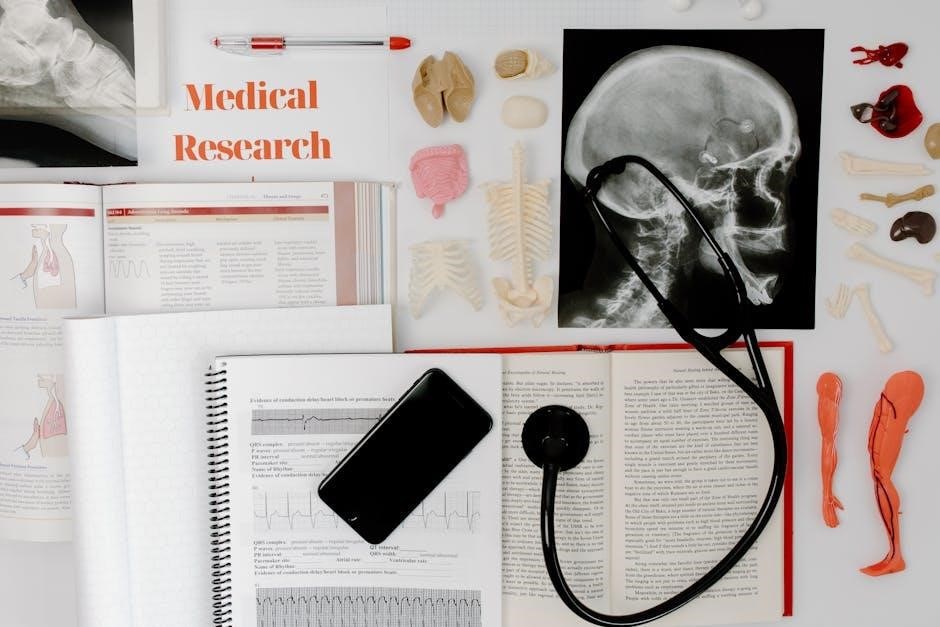Principles of Mathematics 10 provides a foundational understanding of algebra‚ geometry‚ and trigonometry. It emphasizes critical thinking‚ problem-solving‚ and the use of digital resources like PDF textbooks for learning. This course prepares students to approach mathematical concepts logically and confidently‚ fostering a strong base for future studies in mathematics and related fields.
1.1 Overview of the Course Structure
The course is divided into core topics like algebra‚ geometry‚ and trigonometry‚ with assessments including multiple-choice and short-answer questions. Resources such as PDF textbooks and online tools support learning. The structure emphasizes logical reasoning and practical applications‚ ensuring students develop problem-solving skills and a solid mathematical foundation for future studies.
1.2 Importance of Mathematics in Daily Life
Mathematics is essential for problem-solving in everyday situations‚ such as budgeting and financial decisions. It enhances logical reasoning and analytical thinking‚ crucial for science‚ technology‚ and engineering. Understanding mathematical principles fosters critical thinking‚ enabling individuals to make informed decisions in personal and professional life‚ while also preparing them for higher-level studies.
1.3 Key Concepts Covered in Grade 10 Mathematics
Grade 10 Mathematics introduces foundational concepts such as algebraic manipulation‚ solving equations‚ and graphing functions. It covers geometry‚ including properties of shapes and trigonometry. The course also explores introductory calculus and probability‚ providing students with essential problem-solving skills and a solid mathematical foundation for higher-level studies and real-world applications.
Core Topics in Principles of Mathematics 10
Core topics include algebra‚ geometry‚ trigonometry‚ and introductory calculus. These foundational areas develop problem-solving skills and logical reasoning‚ preparing students for advanced mathematical studies and real-world applications.
2.1 Foundations of Algebra
Foundations of Algebra focus on solving equations‚ inequalities‚ and functions. Students learn to manipulate variables‚ graph linear and quadratic functions‚ and understand systems of equations. This builds a strong base for advanced algebraic problem-solving‚ essential for higher-level mathematics and real-world applications in science and engineering.
2.2 Geometry and Measurement
Geometry and Measurement explore properties of shapes‚ angles‚ and solids. Topics include calculating perimeter‚ area‚ and volume‚ as well as understanding trigonometry basics. Students apply Pythagorean theorem and properties of triangles to solve problems‚ enhancing spatial reasoning and practical application skills.
2;3 Trigonometry and Its Applications
Trigonometry introduces the study of triangles‚ focusing on sine‚ cosine‚ and tangent functions. Students explore angles‚ wave patterns‚ and graphing trigonometric functions. Applications include solving problems in physics‚ engineering‚ and real-world scenarios‚ such as calculating heights‚ distances‚ and forces‚ enhancing problem-solving skills and understanding of periodic phenomena.
This section explores basic calculus concepts‚ such as rates of change and accumulation‚ and introduces probability principles‚ including mutually exclusive events. Students learn to calculate probabilities‚ understand distributions‚ and apply these concepts to real-world problems‚ such as data analysis and statistical modeling‚ building a foundation for advanced mathematics and problem-solving skills.

Problem-Solving Strategies
This section focuses on fostering critical thinking and logical reasoning to tackle mathematical challenges effectively. Students learn to break down problems‚ analyze data‚ and apply appropriate strategies for solutions.
3.1 Critical Thinking in Mathematics
Critical thinking in mathematics involves analyzing problems‚ identifying patterns‚ and evaluating solutions. Students develop the ability to question assumptions‚ explore multiple approaches‚ and validate their reasoning. This skill is essential for understanding complex concepts and applying mathematical principles effectively in various scenarios. By fostering a deeper understanding‚ critical thinking enhances problem-solving abilities and prepares students for real-world challenges.
3.2 Logical Reasoning and Proof
Logical reasoning and proof are fundamental skills developed in Principles of Mathematics 10. Students explore deductive reasoning‚ analyze geometric proofs‚ and apply logical arguments to validate solutions. These techniques enhance problem-solving abilities and foster a systematic approach to mathematics. Digital resources like PDF textbooks provide examples and exercises to strengthen understanding and proficiency in constructing and evaluating proofs.
Technology and Digital Resources
Technology and digital resources are integral to Principles of Mathematics 10‚ enhancing learning through PDF textbooks and online tools. These resources support interactive simulations‚ video tutorials‚ and access to solutions manuals‚ fostering a dynamic and efficient study environment.
4.1 Using PDF Textbooks for Learning
PDF textbooks for Principles of Mathematics 10 offer convenient access to course materials‚ enabling students to study anytime‚ anywhere. They provide interactive elements‚ such as hyperlinks and embedded solutions‚ enhancing engagement. PDFs are compatible with various devices‚ making them ideal for flexible learning. Additionally‚ they often include supplementary resources‚ like practice problems and video tutorials‚ to support comprehension and retention of key concepts effectively.
4.2 Online Tools for Mathematics Education
Online tools‚ such as graphing calculators and interactive simulations‚ enhance learning in Principles of Mathematics 10. Platforms like Khan Academy and GeoGebra provide video tutorials‚ practice exercises‚ and visual aids. These resources support personalized learning‚ allowing students to explore concepts at their own pace and deepen their understanding of algebra‚ geometry‚ and trigonometry. They also facilitate collaboration and engagement in a digital environment.

Assessment and Evaluation
Assessment in Principles of Mathematics 10 includes multiple-choice questions‚ short answer problems‚ and projects. Digital resources like PDF exams and solutions manuals help evaluate student understanding effectively.
5.1 Types of Assessments in Mathematics 10
Assessments in Mathematics 10 include multiple-choice questions‚ short answer problems‚ and projects. These evaluate understanding of algebra‚ geometry‚ and trigonometry. Digital resources‚ like PDF exams and solutions manuals‚ provide structured formats for assessing problem-solving skills and logical reasoning‚ ensuring alignment with course objectives and fostering academic preparedness.
5.2 Preparing for Exams and Quizzes
Preparing for exams and quizzes involves thorough review of course materials‚ including PDF textbooks and online resources. Practice with past exams and review questions helps build familiarity with formats and content. Understanding key concepts‚ such as algebra and geometry‚ is essential. Creating a study schedule ensures consistent preparation‚ fostering confidence and readiness for assessments.
Real-World Applications of Mathematics
Mathematics applies to science‚ engineering‚ and finance‚ solving real-world problems. It aids in understanding motion‚ forces‚ and budgeting‚ making it essential for practical and professional decision-making.
6.1 Mathematics in Science and Engineering
Mathematics is fundamental to science and engineering‚ providing tools for analyzing motion‚ forces‚ and energy. It underpins fields like physics‚ chemistry‚ and biology‚ enabling problem-solving and modeling of real-world phenomena. Algebra‚ calculus‚ and trigonometry are essential for understanding scientific principles and designing innovative solutions in engineering‚ making math a cornerstone of technical advancements and discoveries.
6.2 Financial Literacy and Budgeting
Financial literacy involves applying mathematical concepts like algebra and calculus to manage personal and business finances. Understanding budgeting‚ interest rates‚ and investments is crucial for making informed decisions. Mathematics helps in creating financial plans‚ calculating returns‚ and avoiding debt. These skills are essential for practical life‚ enabling individuals to manage resources effectively and secure their financial future through informed planning and analysis.
Course Materials and Resources
Principles of Mathematics 10 offers various resources‚ including PDF textbooks‚ online tools‚ and digital copies. Students can access “Principles of Mathematics 10: Student Text” and supplementary materials for enhanced learning experiences and better understanding of mathematical concepts.
7.1 Recommended Textbooks and Guides
Recommended textbooks include “Principles of Mathematics 10” by Vladimir Lepetic‚ available as a PDF on LitRes‚ and Pearson Canada’s “Foundations and Pre-calculus Mathematics 10.” These resources provide comprehensive coverage of algebra‚ geometry‚ and trigonometry. Additionally‚ “Everything Maths” offers downloadable PDF guides‚ ensuring students have access to practical examples and exercises aligned with curriculum standards for effective learning and understanding.
7.2 Accessing Digital Copies and Solutions Manuals
Digital copies of “Principles of Mathematics 10” are available on platforms like LitRes and Everything Maths. Solutions manuals are also accessible‚ offering step-by-step explanations for complex problems. Additionally‚ Nelson provides PDF versions with access codes‚ ensuring students can easily review and practice with aligned resources‚ enhancing their understanding of key mathematical concepts and problem-solving techniques.

Common Challenges and Solutions
Students often struggle with problem-solving and time management in Principles of Mathematics 10. Utilizing solutions manuals and seeking help from teachers or tutors can effectively address these challenges.
8.1 Overcoming Difficulties in Problem Solving
Many students face challenges in problem-solving due to lack of understanding or poor time management. Breaking problems into smaller steps‚ using online tools‚ and reviewing solutions manuals can help. Practicing regularly and seeking guidance from teachers or study groups enhances comprehension and builds confidence in tackling complex mathematical concepts effectively.
8.2 Time Management for Mathematics Study
Effective time management is crucial for mastering Principles of Mathematics 10. Students should allocate specific study periods for each topic‚ prioritize challenging areas‚ and utilize digital tools like PDF textbooks for efficient learning. Regular review sessions and organized note-taking help maintain consistency‚ ensuring comprehensive understanding and preparedness for assessments throughout the course.

The Role ofTeachers and Tutors
Teachers and tutors play a vital role in guiding students through complex mathematical concepts‚ offering personalized support and fostering a deeper understanding of the subject matter effectively.
9.1 Effective Teaching Methods in Mathematics
Effective teaching methods in mathematics involve interactive resources‚ practical examples‚ and real-world applications. Teachers use digital tools and PDF textbooks to engage students‚ fostering a deeper understanding of concepts. By integrating technology and traditional approaches‚ educators create a dynamic learning environment that encourages critical thinking and problem-solving skills‚ ensuring students grasp mathematical principles comprehensively.
9.2 Benefits of Peer Learning and Study Groups
Peer learning and study groups foster collaborative problem-solving‚ enhancing understanding through shared insights. Students discuss challenges‚ clarify doubts‚ and learn from one another’s strengths. Collaborative environments encourage active participation‚ improve retention‚ and develop teamwork skills. Sharing resources‚ like PDF notes and practice problems‚ further enriches the learning experience‚ making complex concepts more accessible.
Principles of Mathematics 10 equips students with essential skills in algebra‚ geometry‚ and problem-solving. It prepares them for advanced studies and real-world applications‚ fostering logical thinking and adaptability.
10.1 Summary of Key Learnings
Principles of Mathematics 10 covers foundational concepts in algebra‚ geometry‚ and trigonometry. Students gain proficiency in problem-solving strategies‚ critical thinking‚ and logical reasoning. The course emphasizes practical applications of mathematics in real-world scenarios‚ preparing learners for higher-level studies and fostering a strong analytical mindset essential for future academic and professional pursuits.
10.2 Preparing for Higher-Level Mathematics
Principles of Mathematics 10 equips students with essential skills for advanced studies. By mastering algebra‚ geometry‚ and trigonometry‚ learners build a solid foundation for higher-level courses. The curriculum emphasizes problem-solving‚ logical reasoning‚ and practical applications‚ enabling students to approach complex mathematical concepts with confidence and prepare for future challenges in fields like science‚ engineering‚ and finance.